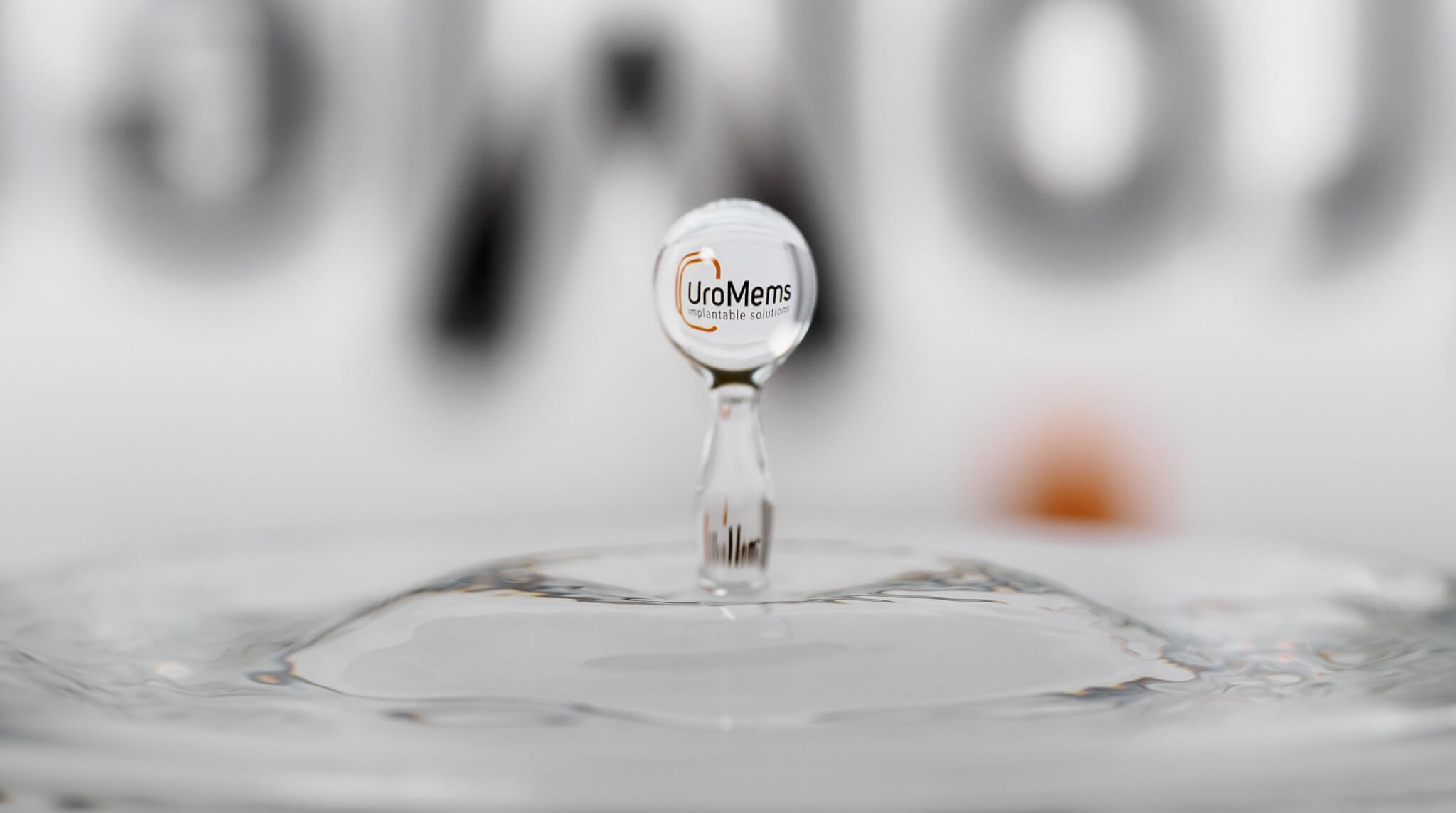UroMems Granted Safer Technologies Program Designation from FDA for Smart Implant to Treat Stress Urinary Incontinence
UroMems Granted Safer Technologies Program Designation from FDA for Smart Implant to Treat Stress Urinary Incontinence
STeP inclusion reflects the potential improvements in safety of its UroActive™ System
GRENOBLE, France and MINNEAPOLIS, April 20, 2023 /PRNewswire/ — UroMems, a global company developing innovative, mechatronics technology to treat stress urinary incontinence (SUI), announced today that they have received Safer Technologies Program (STeP) designation from the U.S. Food and Drug Administration (FDA) for UroActive Smart Continence Therapy. STeP is a collaborative program intended to help reduce the time it takes to develop and obtain marketing authorization for eligible devices.
“We are delighted to receive this designation and excited to advance the development of our UroActive system – the first-of-its-kind fully automated AUS implant designed to treat SUI in both men and women,” said Hamid Lamraoui, UroMems chief executive officer and co-founder. “We thank the FDA for acknowledging the importance of safety above all for patients.”
UroActive is the first smart active implant that treats SUI, powered by a MyoElectroMechanical System (MEMS). This innovative system is placed around the urethral duct and is automatically controlled based on the patient’s activity, without the need for manual adjustments, intending to provide patients with ease of use and a better quality of life than current options.
SUI, or involuntary urinary leakage, affects an estimated 40 million Americans and 90 million Europeans, and occurs when the pressure in the bladder exceeds that of the muscle (the sphincter) around the urethra, caused by activities involving high intra-abdominal pressure, like coughing, laughing and exercising. SUI significantly impacts quality of life, as it can be debilitating, and often leads to depression, low self-esteem and social stigma. While mild SUI is addressed by pelvic floor re-education and bulking agents, moderate and severe SUI historically have only had two options: mesh sling or artificial urinary sphincter.
“The STeP approval is proof that the FDA recognizes the potential for UroActive to improve upon safety for patients with severe SUI, while also designed for an improved surgical experience for the OR team, surgeons and most importantly, their patients,” said Professor Pierre Mozer, UroMems chief medical officer and co-founder.
UroMems aims to restore the quality of life, dignity and self-esteem of millions of men and women worldwide suffering from poorly treated chronic conditions by the commitment to change the perception that these disorders are inevitable as one grows older and is simply something to endure with no real solution. UroMems is revolutionizing the treatment of SUI with smart active implants, using the latest technological advances in the field of embedded systems and micro-technologies for the development of its groundbreaking solutions.
About STeP
Launched in January of 2021, the FDA’s Safer Technologies Program is a voluntary program for certain medical devices and device-led combination products that have the potential to be safer than currently available treatments or medical diagnostics. The program is intended to help patients have more timely access to products by expediting their development, assessment, and review, while maintaining the FDA’s standards for safety and effectiveness, data requirements, and quality of review.1
STeP participation does not imply product authorization. UroActive has not received marketing authorization from the FDA and is not available for sale in the United States.
About UroActive
UroActive is an active implantable electronic artificial urinary sphincter that is being developed to compensate for sphincter insufficiency in patients, both men and women, with SUI. It is based on a unique bionic platform using embedded smart, digital and robotic systems which, based on data collected from a patient, create a treatment algorithm that is specific for each patient’s needs. The UroMems technology platform is protected by more than 100 patents and is designed to overcome the limitations of current solutions by optimizing safety and performance, patient experience and surgeon convenience.
About UroMems
Founded in 2011 by Professor Pierre Mozer, Hamid Lamraoui and Stéphane Lavallée, UroMems aims to restore the quality of life, dignity and self-esteem of millions of men and women worldwide suffering from untreated chronic conditions by the commitment to change the perception that these disorders are inevitable as one grows older and is simply something to endure with no real solution. The first challenge for the company will be applying embedded mechatronics methods and smart systems for treating urinary incontinence. Designed by urologists and collaborating scientists and engineers, UroActive intends to provide a new standard of care combining safety, efficacy, durability and ergonomics fitting any individual’s lifestyle and anatomy.
Since the inception of the company, significant investments have been made for the development of UroMems’ first product. This includes two financing rounds totaling 46 million euros, led by Wellington Partners, Bpifrance, Supernova Invest, b-to-v Partners AG, Cita Investissement, Hil-Invent, Financière Arbevel and the founders. The company has received several awards for innovation, including the Prix Galien Award Medstart’up and the Worldwide Innovation Challenge initiated by the French government. For more information, please visit www.uromems.com.
1 https://www.fda.gov/news-events/press-announcements/fda-roundup-march-7-2023
Media Contact
Shelli Lissick
651-276-6922
SOURCE UroMems

MinervaX Commences First Phase 1 Clinical Study of Novel GBS Vaccine in Older Adults
MinervaX Commences First Phase 1 Clinical Study of Novel GBS Vaccine in Older Adults
• Expands development of novel GBS vaccine in older adult population
• Targeting significant and growing unmet medical need of GBS infection
Copenhagen, Denmark, 17 April 2023 – MinervaX ApS, a privately held Danish biotechnology company developing a novel vaccine against Group B Streptococcus (GBS), announces the first phase 1 clinical study in older adults of its novel GBS vaccine, at CEVAC (Centre for Vaccinology) in Ghent, Belgium.
GBS is a global unmet medical burden and can cause serious illness in people of all ages, worldwide. It is normally associated with infection in pregnant women and new-born babies; however, invasive GBS disease in adults has been increasing over the last 40 years. The older adult population (>65 years of age) and adults with underlying chronic health conditions (diabetes mellitus, cancer, immune suppression, obesity) are at particular risk of invasive GBS disease. There is currently no vaccine available.
The clinical study will investigate the safety and immunogenicity of two dose levels on the MinervaX novel GBS vaccine in an older adult population from 55 to 75 years of age, with and without underlying medical conditions. The trial will investigate the safety and immune response to the dose level currently under development for use in pregnant women (50 μg of each fusion protein) and a higher dose of 125 μg of each fusion protein. Since older adults, certainly those with comorbidities, often mount a less strong immune response than a younger population, up to three doses will be investigated in this trial [clinicaltrials.gov under the identifier NCT05782179].
MinervaX has completed enrolment and dosing of its 2nd phase II clinical trial of its novel GBS vaccine in pregnant women across Denmark, the UK and South Africa. Details of MinervaX’s ongoing clinical trials can be found at clinicaltrials.gov under the identifiers NCT04596878 and NCT05154578.
Lidia Oostvogels, Chief Medical Officer of MinervaX, said: “Expanding the development of our GBS vaccine for use in an older adult population, including people with increased risk for GBS due to underlying co-morbidities, is a very important step for MinervaX in the battle against this pathogen. This builds on our efforts and experience to develop a product to provide protection to the most vulnerable populations, i.e., neonates in our maternal immunization program, and now older adults including those with certain co-morbid conditions.”
Prof. Isabel Leroux-Roels, Principal Investigator at CEVAC, commented: “GBS is known to cause potentially life-threatening infections in Older Adults and currently there is no vaccine available to prevent this. All the team at CEVAC are very happy to contribute to the development of this vaccine for this high-risk population.”
Prof. Paul Heath, Director of the St George’s Vaccine Institute, London and Lead Investigator of MinervaX’s Phase IIb study across Denmark, the UK and South Africa, remarked: “Streptococcus agalactiae is a common commensal in humans and approximately 25% of all adults will be colonised with GBS in the gastrointestinal or genitourinary tracts at any given time. We are aware of the considerable global burden of this invasive GBS disease in babies and pregnant women and of the urgent need for a vaccine to prevent this. More recently, we have become aware of the burden of GBS in non-pregnant adults, particularly in older adults, and those with underlying health conditions such as diabetes mellitus. There is no current mechanism for preventing GBS disease in this growing population, and there is a well recognised morbidity and mortality. The need for a vaccine for this group of people is therefore urgent and the commencement of GBS vaccine trials in this population is therefore an important and welcome development.”
For further information please contact:
MinervaX
Per Fischer | Chief Executive Officer
Email:
Optimum Strategic Communications
Mary Clark / Jonathan Edwards/ Zoe Bolt
Email:
Tel: +44 (0) 203 882 9621
Notes to Editors:
About MinervaX
MinervaX is a Danish biotechnology company, established in 2010 to develop a prophylactic vaccine against Group B Streptococcus (GBS), based on research from Lund University. MinervaX is developing a GBS vaccine for maternal immunization, and now also for vaccination of older adults, likely to have superior characteristics compared with other GBS vaccine candidates in development. The latter are based on traditional capsular polysaccharide (CPS) conjugate technology. By contrast, MinervaX’s vaccine is a protein-only vaccine based on fusions of highly immunogenic and protective protein domains from selected surface proteins of GBS (the Alpha-like protein family). Given the broad distribution of proteins contained in the vaccine on GBS strains globally, it is expected that MinervaX’s vaccine will confer protection against virtually 100% of all GBS isolates. www.minervax.com
About Group B Streptococcus (GBS)
Streptococcus agalactiae or Lancefield’s Group B Streptococcus (GBS) is a common commensal in humans, approximately 25% of all adults will be colonised with GBS at any given time. Invasive GBS disease is normally associated with infection in pregnant women and new-born babies; however, invasive GBS disease in adults has been increasing over the last 40 years. The older adult population (>65 years of age) and adults with underlying chronic health conditions (diabetes mellitus, cancer, immune suppression, obesity) are at particular risk of invasive GBS disease.
Group B Streptococcus disease in non-pregnant adults causes secondary and primary bacteraemia, septic arthritis, endocarditis, prosthetic joint infection, and necrotising myositis and fasciitis.
It is apparent that outside of pregnancy and the neonatal period, GBS infection results in high morbidity and mortality rates. There is no preventative treatment, cases are managed with antibiotics when an infection is diagnosed. There is a clear unmet medical need for a preventative vaccine that could provide protection to all adults but particularly to the older adult population or those at risk of infection due to underlying medical or demographic conditions. In addition, the incidence is increasing and will probably continue to increase with an increasing older adult population and an increase in the prevalence of obesity and type 2 diabetes around the world.
Sidekick Health chosen as partner for White House’s CancerX project to rapidly accelerate the pace of cancer innovation in the U.S.
Sidekick Health chosen as partner for White House’s CancerX project to rapidly accelerate the pace of cancer innovation in the U.S.
Recently announced by U.S. President Joe Biden and Dr. Jill Biden as part of the reignited national Cancer Moonshot initiative, Sidekick is one of 15 organizations chosen to help tackle the root causes of health inequity and accelerate digital innovation to solve some of the most pressing challenges facing patients with cancer.
Sidekick Health today announces that it will be a partner on the inaugural CancerX project, a public-private partnership that was recently launched by U.S. President Joe Biden and Dr. Jill Biden as part of the reignited national Cancer Moonshot initiative. The project, co-hosted by the Digital Medicine Society (DiMe) and Moffitt Cancer Center, aims to unite the diverse stakeholders and innovators necessary to design and create a future that is dedicated to improving cancer outcomes.
The Cancer Moonshot initiative has ambitious goals to cut the death rate from cancer by at least 50% over the next 25 years and to improve the experience of people and their families living with and surviving cancer. The inaugural project, “Advancing Digital Innovation to Improve Equity and Reduce Financial Toxicity in Cancer Care and Research,” is already formed and will start work in early April. It will focus on the root causes of financial toxicity (a term used to describe how out-of-pocket costs related to cancer care can result in financial problems for patients and their families) and health inequity to accelerate human-centered digital innovation to solve some of the most pressing challenges facing cancer patients, providers, and researchers.
In 2023, the American Cancer Society reported that there would be an estimated 1.9 million new cancer diagnoses, yet innovative digital approaches for delivery and precision oncology care remain limited. Existing approaches are also not yet applied at scale to minimize the burden of financial toxicity to patients with cancer and reduce the associated healthcare access, outcome, and economic disparities. The opportunity to improve cancer care and outcomes is clear and significant. For digital innovation to deliver on its potential to improve the lives of all people with cancer, prioritization of opportunities for the greatest impact is key. This includes improving access, equity, and inclusion when developing and deploying digital solutions for cancer care.
By identifying the biggest areas of potential impact, developing actionable tools, and providing incentive models, Sidekick, alongside other partner organizations, will share its wealth of expertise in digital therapeutics and help pave the way in fulfilling the promise of digital innovation across the full continuum of care.
Through partnerships with health insurers and pharmaceutical companies, Sidekick’s unique platform already supports people living with cancer both in the US and Europe. For example, in a strategic collaboration with Eli Lilly, Sidekick provides patients living with breast cancer access to a tailored digital health plan, engaging in health-improving tasks which promote behavior modification and overcome barriers to change. It focuses on five main areas: stress management, physical activity, diet, sleep, and medication adherence, the latter representing a significant obstacle to recovery in patients undergoing cancer treatment. Patients are also given access to educational content that has been created in close collaboration with clinical experts, patients, and patient advocacy groups, helping to provide them with unique insights into living with cancer. Sidekick also delivers programs for other chronic conditions, such as obesity and cardiometabolic diseases, and promotes a personalized approach through adaptive care pathways. As part of the CancerX project, Sidekick will help champion the value of high-quality digital innovation in cancer, address methodological gaps where they exist, and define best practices for successful and equitable implementation.


